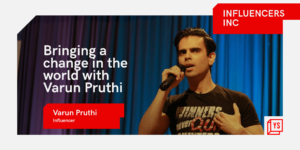Beauty shopping can be exhausting. There are too many brands selling similar products, claiming ‘amazing’ results — across prices and skin types. In fact, the Indian cosmetics market was valued $1,3191.23 million in FY20 and is expected to grow at a CAGR of 16.39 percent through FY2026 to reach $2,8985.33 million by FY26, says Research and Markets. There are over 600 brands manufacturing and selling products in this segment.
All this means that when it comes to choosing products, we either play a ‘guessing game’, go by the recommendations of friends and beauty influencers, or consult a dermatologist. In the first two cases, we often end up purchasing products that may not work on our skin type, while derma products are often not pocket-friendly.
Realising a business opportunity and to help people pick the right beauty products matching their individual needs, Hyderabad-based Sharmila Gayathri Chalasani and Vignesh Charllo invented GlaMate, a unique platform that uses an AI-powered algorithm to provide personalised beauty recommendations.
“Every skin is unique with different goals. There is a plethora of products available in the Indian market and majority of people are playing hit and trial games with them. There was a need for tech in this segment to help people make the right choices and not end up disappointed or burn a hole in their pocket,” says Sharmila, who toyed with the idea while pursuing her master’s in data analytics from the University of Cincinnati, US.
Building a ‘beautiful’ algorithm
Frustrated by her own struggle to find products for her acne issue, combined with expensive dermatologists’ visits, Sharmila decided to leverage technology to resolve the problem.
“I pitched the idea of developing an AI algorithm from the combined expertise of data scientists and dermatologists to my senior Vignesh,” says the founder.
In 2020, the duo took a survey with the help of a private agency to analyse the Indian market. Around 300-400 people were asked about their product needs, skin types, skin issues, etc.
“It took us two months to understand the market. Indian products are very different as compared to the ones abroad. Majority are inclined towards organic and natural ingredients compared to scientific formulations. While drawing the algorithm, we concentrated on the ingredients and then tested their effectiveness,” says Vignesh.
A team of about 10 aestheticians from India and the US was brought together to build the algorithm after the database was built.
“There were about 12 skin concerns and combinations that were incorporated in the algorithm. The product recommendations made on the platform are on the basis of these skin types,” he adds.
After training the algorithm for over five months, the founders bootstrapped the startup with their personal savings of Rs 10 lakh, and formally launched the platform in May, 2021.
Providing impartial suggestions
Once a user signs up, they are asked to take a ‘beauty quiz’, which evaluates the skin concerns. Based on the answers, a beauty profile is created and is processed by the algorithm that lists out top three suitable products available in India.
Prices from partnered retailers, ecommerce websites, and brands are displayed for each product, and the users are redirected to the website of their choice. This also helps in price comparison and makes the platform unbiased, says Vignesh.
Within two months of launch, the startup has gained considerable traction in the market with over 15,000 subscribers and 2,000 daily visitors, besides a strong social media following.
The revenue model is based on affiliate marketing. The startup has partnered with major ecommerce portals like Amazon, Flipkart, Snapdeal, Myntra. and Tata CliQ Luxury, and over 20 beauty brands, including Mamaearth, Juicy Chemistry, WOW Skin Science, Neemli Naturals, Re’equil, Plum, and Earth Rhythm.
The channel commission for the former is around 4-5 percent while the latter can go as high as 35 percent.
USP: Personalisation is key
The platform claims to be unbiased when it comes to product recommendation. Its USP lies in the personalised experience, which consumers may not get through blogs and other channels.
“We want to create a unique beauty shopping experience and eliminate the whole guessing game. Our platform has an interactive format, which maintains user’s interest. The bounce rate is as low as 30 percent,” says Sharmila.
Over the past few years, both ML and AI algorithms have penetrated the beauty and cosmetics industry. A lot of brands are partnering with AI-powered beauty recommendation platforms to increase conversion rates and Average Order Value (AOV). Platforms like SkinKraft and Liphue are also using tech to create customised products for people instead of cross selling.
However, it is cost efficient to partner with a startup working on the tech side, instead of trying to build something in-house. One of the biggest players in this market is London-based My Beauty Matches, which has built a stack of 4,00,000 products from over 3,500 brands and 170 retail partners.
GlaMate has chosen a similar path, but in a different market with a proprietary algorithm.
Future plans
Going forward, GlaMate plans to enter the cosmetics market with its own line of products. Besides adding a more personalised touch, the startup will soon have a dermatologist consultancy service on its platform.
“In a few months, we will be in a position to come up with specialised products for Indian skin types as we gather more data,” says Vignesh, who adds that they are in advanced talks with Purplle for a tie-up.
The focus remains on building the database and gaining feedback as more and more users sign up.
“We will go for external funding once we touch 10,000 daily users, high affiliate conversions, and other sources of income. We are looking for a mentor who has strong industry knowledge and will help us grow smarter,” the founders sign off.










